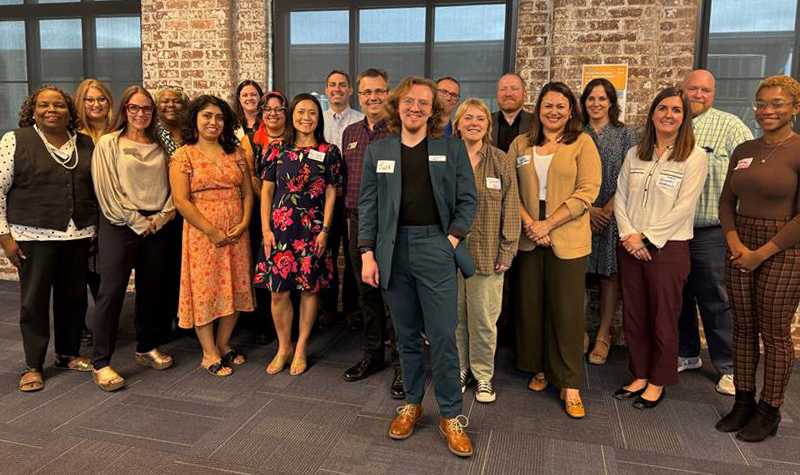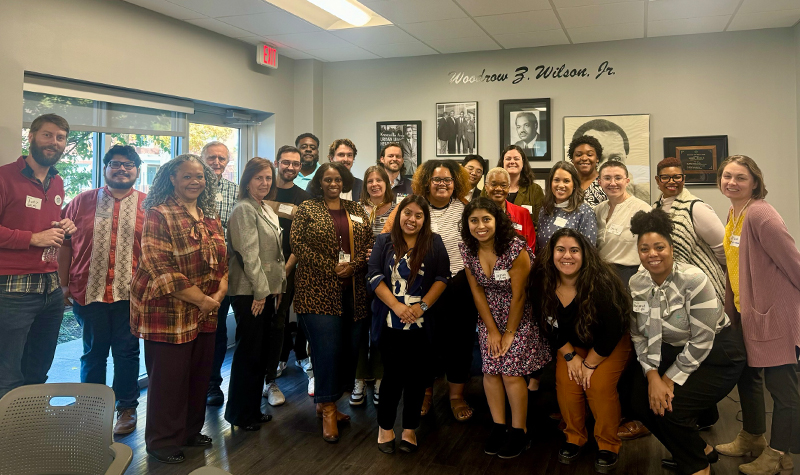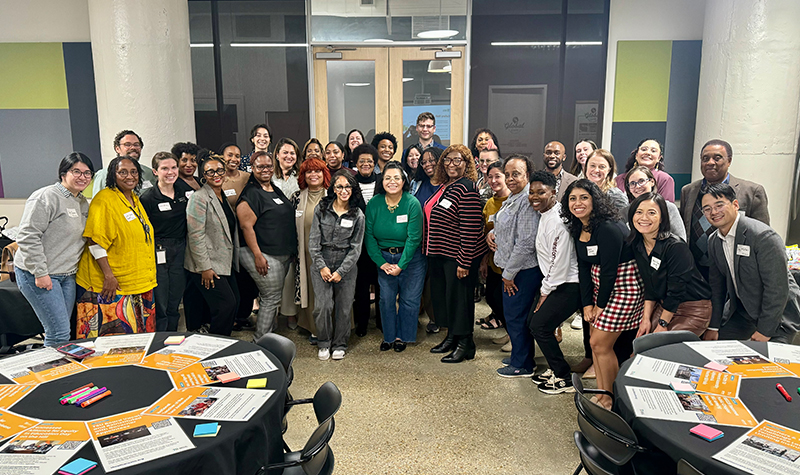By: Meili Powell, Assistant Director of Advocacy & Engagement
EdTrust-Tennessee
Collective advocacy for equity in 2025 will be more consequential than ever. While there is uncertainty over the implications of the next four years, I am certain about the urgent need to work in community with others to achieve educational justice for our students.
Powered by EdTrust-Tennessee, our work is deeply rooted in community through the TN Alliance for Equity in Education—a coalition of over 85 diverse partners united by a shared policy agenda.
We cannot enter this year business as usual. There are real, imminent threats impacting students from low-income backgrounds, students of color, students with disabilities, those in rural areas, justice-impacted students, student parents, LGBTQ+ youth, and undocumented students. For example, with Plyler v. Doe at risk, it is vital to uplift our partners serving undocumented students to protect undeniable access to education.
Fall Engagement Tour 2024 regional convenings with Alliance members in Chattanooga, Knoxville, Memphis and Nashville
As the 114th General Assembly begins, our Alliance understands the importance of maintaining our flag in ground for what we hope to be true for students with the belief that schools and postsecondary institutions create pathways to a more just Tennessee. However, more work is needed to remove systemic barriers along the educational continuum.
To highlight our shared values, we release a shared policy agenda that reflects the diverse issues EdTrust and our partners are prioritizing. Throughout our 2024 Fall Engagement Tour, we connected with over 200 Alliance members to get feedback and ensure all partners see themselves reflected in our collective advocacy. Partners are not actively engaging on all issues, but each brings their own expertise. We may not agree on each issue but recognize that varying perspectives make our collective advocacy stronger.
Our partners activate our policy agenda at the local and state level through advocacy campaigns, programming, and community engagement. Here are a few examples:
Foundational Priority: Better Data for Better Decision Making
- Chattanooga 2.0 launched a new 2030 Goals Dashboard in partnership with their Data Council that reflects the organization’s five focus areas, from Kindergarten Readiness to Thriving Wage Jobs, and aims to serve as a data-driven foundation for collaboration. Additionally, Chattanooga 2.0 created a Mental Health and Wellbeing Dashboard and fiscal analysis on Hamilton County’s COVID relief funding.
- Tennesseans for Quality Early Education convenes Bright Start TN to accelerate early learning outcomes statewide with regional community partnerships including STRONG Accountable Care Community, First8 Memphis, and Chattanooga 2.0. This initiative is anchored in 15 measures of success to help ensure a data-driven approach to strengthening quality early childhood systems and outcomes.
Priority 1: Promote Accessible, Rigorous, and Affirming Learning Experiences
- The TN Coalition for Truth in Our Classrooms, a subset of the Alliance of over 30 partners, is mitigating harm from evolving censorship in our schools and institutions.
- Centro Hispano de East Tennessee is developing the capacity of Latino parents and caregivers in Knox County to advocate for their children with a focus on TCAP’s impact on English Learners’ retention and promotion, equitable treatment for special education and academic opportunities.
- The Early Literacy Consortium (ELC), convened by First8 Memphis, Stand for Children TN and Literacy Mid-South, ensures equitable access to literacy for the children of Shelby County by bringing together stakeholders across sectors to promote communication and collaboration regarding early literacy community efforts and strategy. For example, the ELC partnered with Memphis Shelby County Schools to create a Memphis Early Literacy Community Partnership Plan.
- Save the Children Action Network is building a coalition through a series of trainings targeting parents and caregivers in rural communities to connect early childhood education and childhood hunger to the policymaking process, teach advocates how to tell their stories, and how to meaningfully connect with lawmakers.
Priority 2: Address Funding and Resource Equity
- Statewide Organizing for Community eMpowerment launched their #PublicSchoolStrongTN. This campaign empowers ordinary people to organize for honest, equitable, safe, and fully-funded public education so that every child can thrive in high-quality public schools in the communities where they live and play.
- The Nashville & Child Youth Collaborative, including 8 Alliance partners (Alignment Nashville, Diverse Learners Cooperative, FUTURO, Nashville Public Education Foundation, Nashville Teacher Residency, Oasis Center, Persist & Teach for America Nashville-Chattanooga), launched a shared agenda to call on city leaders to publicly commit to key actions. These strategies include ensuring adequate investments in systems and structures that support child and youth development such as early childhood development, mental health, and community spaces.
Priority 3: Increase Educator Diversity and Quality
- Memphis Teacher Residency, Nashville Teacher Residency, Relay Graduate School of Education, Teach for America (Memphis, Nashville-Chattanooga & Appalachia) are creating sustainable, high quality, and low cost pathways into teaching that move the teacher workforce closer to student racial and linguistic diversity.
- PIVOT: School Improvement Leaders supports schools and districts by focusing on the strategic development of school leaders through cohort models and designing, improving, and/or executing systems around leadership development. Their impact is tracked across seven metrics including math and ELA achievement, growth, chronic absenteeism, teacher retention, graduation rate and Ready grad rate.
- TN Educator of Color Alliance supports school districts with retaining educators of color through fellowships, training and programming, including Advocacy Academy.
Priority 4: Support Students’ Social-Emotional and Academic Development
- AWAKE (Advocates for Women’s & Kid’s Equality), as a leader in the TN Menstrual Equity Coalition, launched a campaign and advocacy toolkit around the Menstrual Hygiene Product Accessibility Act (HB29), which would address period poverty by requiring all public high schools to provide period products at no cost to students.
- TNSTEP (Special Education Support for Tennessee Families), a member of the TN Disability Coalition, established a youth council and training series to empower young advocates to take active roles in shaping the policies affecting them and issues including voting, disability rights, and self advocacy.
- TN Justice Center launched a Healthy Meals Healthy Kids campaign, advocacy toolkit, and coalition to push for legislation that would require each local school board to establish a free meals program for breakfast and lunch for each student enrolled in a public school in the board’s district.
- Youth Justice Action Coalition (YJAC), a program of Stand for Children TN , is a powerful initiative where justice-impacted youth advocate for systemic change in the youth justice system and an end to the school-to-prison pipeline through their “Break the Chains Demands”. YJAC is developing “YJAC in Schools” to extend empowerment experiences to meet youth where they’re at, particularly in schools.
Priority 5: Expand Access and Success in Higher Education
- TN College Access and Success Network launched a report: Counting the Cost: An Overview of Student Basic Needs Insecurity at Nashville State Community College, which focuses on the financial barriers – including both tuition and non tuition barriers – faced by students from low income backgrounds.
- tnAchieves advocated in 2024 for HB2184/SB1783, which seeked permanent, recurring funding to support completion grants for Pell-eligible Tennessee Promise students. This year, tnAchieves alongside community partners will support a budget ask of $5,000,000 to ensure every Pell Grant eligible student using TN Promise will be supported by a coach and emergency grant funding.
- EdTrust-Tennessee’s Undocumented Students Resource Hub highlights ways to advocate that offer support to undocumented and DACA students in Tennessee to achieve their academic and career goals. One resource is Experts in the Field, including Su Casa Family Ministries, FUTURO, Persist, Oasis Center, Centro Hispano de East Tennessee, La Paz Chattanooga, HOLA Lakeway, Equal Chance for Education, and TN Immigrant and Refugee Rights Coalition.
The above examples are not representative of all our partners’ advocacy, so I encourage you to follow all Alliance members. Stay engaged with EdTrust by signing up for our weekly newsletter, which includes our 2025 Bill Tracker. Our Policy Agenda will inform our Ten for Tennessee awards, ten bills that best advance educational equity for our students. Check out our future events and stay connected with the Alliance’s collective advocacy efforts.



